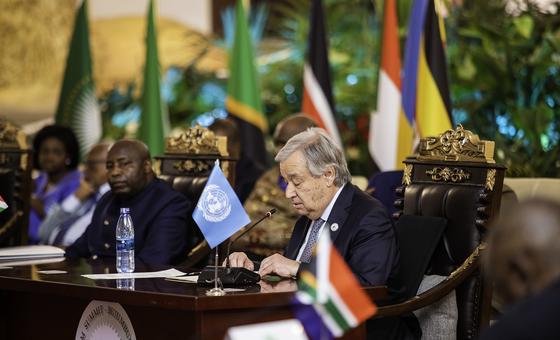At a time when more than 100 armed groups are plaguing communities in the Democratic Republic of the Congo (DRC) with grave human rights violations and sexual violence, the UN chief said on Saturday that swift, bolstered efforts must end the chronic cycle of conflict in the natural resources-rich Great Lakes region of Africa.
“It is time to end the violence,” UN Secretary-General António Guterres said at the high-level meeting of the Regional Oversight Mechanism of the Peace, Security and Cooperation Framework for the Democratic Republic of the Congo (DRC) and the region, held in Bujumbura, Burundi.
Since the resurgence of the M23 armed group in DRC in 2021, more than 500,000 people have fled the violence, he said, also raising concerns about the current “extremely worrisome” security situation in Ituri province.
Current crisis demands action
“The current crisis shows that much still remains to be done,” he warned, adding that the ongoing violence is threatening the stability of the entire Great Lakes region.
The Framework, signed in 2013 in Addis Ababa, had “raised many hopes” of ending decades of violence, he said, encouraging redoubled efforts from the signatory countries, African Union, International Conference on the Great Lakes Region, and the Southern African Development Community (SADC).
‘Lay down your arms’
Reiterating his call to armed groups, he said “lay down your arms immediately and rejoin the demobilization, disarmament, and reintegration progress.”
Within the Framework, boosted efforts must now focus on building a foundation of dialogue among parties to identify sustainable solutions to differences, ending impunity for perpetrators of cross-border crimes, and inclusively advancing peace, he stressed.
Indeed, for peace to be sustainable, he said the voices of women, young people and displaced persons must be fully heard in all political, security and judicial processes.
Peace and development go ‘hand in hand’
Turning to the region’s bounty of rich natural and cultural resources, he said DRC is home to the world’s second largest rainforest, accounting for 10 percent of global biodiversity.
“We must ensure that it becomes a source of prosperity and development, not of conflict, rivalries, and unsustainable exploitation,” he said. “Peace and development must go hand in hand.”
“The UN remains fully engaged, by your side,” he said, welcoming the initiative taken by the Peace and Security Council of the African Union in February to revitalize the Framework.
“Only together can we achieve the common objectives of peace, security, and cooperation of the Addis Ababa Framework,” he said. “The peoples of the region are counting on us.”

